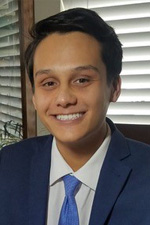
Enrique Arcilla
Urban Studies and Planning

- Profile
Profile
Enrique came to UC San Diego from California's Inland Empire city of Apple Valley, which he believes many others consider a "sideshow" to the vibrant coastal economy. The Eleanor Roosevelt College student said this was an achievement that opened his eyes. “It taught me that part of my mission is making sure places like Apple Valley aren’t forgotten in my professional world of urban studies and planning.”
Representing UC San Diego as an ‘expert witness’ for the mock trial at Nationals in Philadelphia, Enrique was up to the challenge of crafting a character, an accountant discussing ledgers and lost profits, who could hold the attention of a panel of experienced attorneys. “The achievement of representing my school on a national stage led me to see how I can amplify the impact of my learning by making it understandable to anyone.”
After moving on from mock trial, Enrique began working in the Teaching + Learning Commons' Writing Hub, where he learned about GAP (genre, audience, purpose) knowledge. This knowledge later made him a vital member of the UC San Diego ProtoLab's Civic Research Team. "The lessons in accessible language from mock trial nationals guided my writing of problem briefs for people who might never have heard of a conditional use permit before."
Through everything he does toward obtaining his undergraduate degree, Enrique’s home in the desert stays with him through it all: “Its weight inspires me to spend my professional life learning how areas like my hometown can situate themselves within the existing regional economy, not as places to escape from or define by contrast to the wealthy coast, but as a home for young people who might otherwise see their only path upwards as far away from their first communities. I hope to learn how municipalities might best synchronize local efforts in economic development with regional planning and want to subsequently help disseminate and apply that information in places like Apple Valley. I plan to develop and apply this knowledge in a focused, near-the-ground career in economic development for some portion of inland California.”
His goals also are shaped by his status as a minority: “My mother is Costa Rican and my father is a Pacific Islander, but I jokingly call myself “ambiguously brown…This ambiguity leaves me without a clear minority culture to call my own. I am an advocate for anyone disadvantaged by race, class, and history — even if the world doesn’t know what to make of them. My self-definition frames the desert for me, a place where I see geographic disempowerment, an anonymity even within California, and a community I will not leave behind.”
